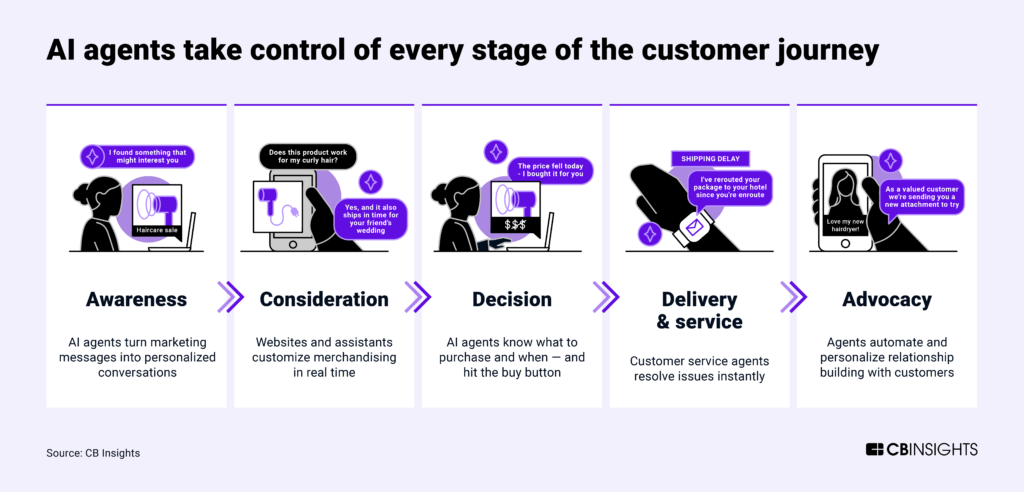How Custom AI is Revolutionizing Programmatic Ad Buying
This is today's edition of Agentic Marketing, our weekly newsletter that shares case studies on intelligent automation marketing and trends in AI marketing.
In the Spotlight
In today’s hyper-competitive digital landscape, brands are under constant pressure to maximize their ad spend and deliver personalized, high-performing campaigns. Enter custom AI—a game-changer for programmatic ad buying.
According to AdAge, Lenovo used Scibids' AI to increase ad ROI by 270%, despite a 34% higher cost per impression.
But what makes this approach so powerful, and how can your brand replicate their success? Let’s dive in.
The Rise of Custom AI in Programmatic Advertising
Programmatic ad buying has long been a cornerstone of digital marketing, but traditional methods often fall short when it comes to precision and efficiency.
Custom AI tools, developed by innovative startups like Cognitiv, are stepping in to fill the gap. These tools combine large language models (LLMs) with proprietary algorithms to analyze vast datasets, predict optimal ad placements, and refine audience targeting—all in real time.
Custom AI is not just about automation; it’s about making smarter, data-backed decisions that drive measurable results.
By integrating seamlessly with existing programmatic platforms (e.g., DSPs, SSPs), these AI solutions minimize disruption while maximizing impact.
How Custom AI Works: A Technical Breakdown
At its core, custom AI for programmatic ad buying operates as a predictive analytics platform. Here’s how it works:
Data Analysis: AI algorithms sift through massive datasets to identify patterns and trends.
Audience Segmentation: The tools pinpoint new target audiences that traditional methods might miss.
Bid Optimization: AI predicts the best ad placements and adjusts bids in real time to maximize ROI.
The real power of custom AI lies in its ability to learn and adapt, delivering increasingly precise targeting with every campaign.
While the technology is highly autonomous, it still requires technical expertise and robust data infrastructure to function effectively. Brands must invest in data scientists and ensure their ad tech stack is AI-ready.
Why This Matters: The Bigger Picture
Custom AI isn’t just a flashy new tool—it’s part of a broader shift toward AI-driven decision-making in marketing. As consumer behavior becomes more complex and data-driven, brands that fail to adopt AI risk falling behind.
The future of marketing is not just about reaching the right audience; it’s about reaching them in the right way, at the right time, with the right message.
This trend is particularly relevant for programmatic advertising, where inefficiencies like suboptimal ad placements and wasted ad spend have long been pain points. Custom AI addresses these challenges head-on, offering a competitive edge in crowded markets.
Actionable Takeaways for Marketers
Ready to harness the power of custom AI for your programmatic ad buying? Here are three steps to get started:
Explore AI Partnerships
Partner with an ideal provider to integrate custom AI into your ad strategy.
Ensure your existing ad tech stack (e.g., DSPs, SSPs) is compatible with AI-driven solutions.
Invest in Data Infrastructure
Build a robust data pipeline to support AI tools.
Train your team on AI and programmatic technologies to ensure smooth implementation.
Measure, Iterate, and Optimize
Continuously monitor key metrics like CTR, ROAS, and conversion rates.
Use AI-driven insights to refine your targeting strategies and optimize ad spend.
As AI models become more advanced, the possibilities for programmatic ad buying are virtually limitless. Expect even greater precision, automation, and personalization in the years to come.
Source: Brands Like Lenovo and Sargento Use Custom AI for Programmatic Ad Buying
Trends to Watch
A Northeastern research reveals AI-powered influencers may harm brand reputation more than human counterparts, as consumers perceive less accountability, urging brands to monitor and regulate virtual influencer actions. [Northeastern University]
AI Agents Revolutionize Customer Buying Process
CB Insights predicts AI agents will transform the customer journey, enabling autonomous shopping. Tech giants like Amazon and Google are leading this shift, leveraging first-party data for personalization and redefining loyalty programs.
This evolution will streamline purchases and reshape consumer-business relationships. [CB Insights]
Agentic AI Transforms Advertising Roles by 2025
Agentic AI, combined with automation, will revolutionize four key advertising roles—campaign analyst, ad executive, copywriter, and strategist—by streamlining workflows, enhancing efficiency, and enabling real-time decision-making.
Insights from Fluency highlight its potential to reduce manual tasks, improve ROI, and free teams for strategic innovation. [The Drum]
Quotes
We expect to be building a trusted answer, an answer with perspective, an answer with opinion, an answer coming from a point of view you wouldn't expect to get, a surprising answer or the answer you would expect from this brand.
- Jonathan Roberts, Chief Innovation Officer of Dotdash Meredith
In a Newsweek article about AI in media and the value of human creativity in content creation, he said this.
Fresh Finds
Here's what's new with AI tools for creators and marketing.
1. YouTube Enhances Audio Tools, Tests Paid Hype YouTube introduces AI-based audio replacement options and experiments with paid Hype points to boost smaller creators' visibility. [Social Media Today]
2. Alibaba Opens AI Video Models for Global Use Alibaba releases four open-source AI models for video generation, boosting competition with proprietary systems like OpenAI. [CNBC]
3. Amazon Tests Video Ads in AI Shopping Tool Amazon introduces video ads in Rufus, its generative AI shopping assistant, expanding beyond text-based search ads. [Adweek]
4. Pega Launches AI-Powered Customer Engagement Tool Pega introduces a generative AI tool for visualizing customer journeys, refining strategies, and optimizing personalized engagement across channels. [Business Wire]
5. AI Marketing Agents Revolutionize Direct Mail Campaigns Penny by BirdseyePost automates targeted direct mail campaigns using AI, enabling personalized customer engagement with minimal human effort. [Trend Hunter]
6. AI-Powered Marketing Automation for Businesses Digibate uses AI to automate digital marketing, enabling businesses to save time and costs while maintaining consistent online presence. [StreetInsider]





